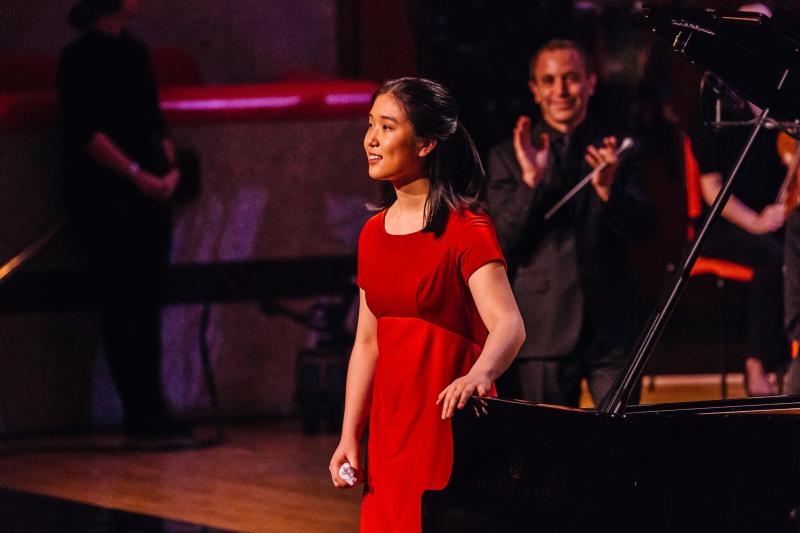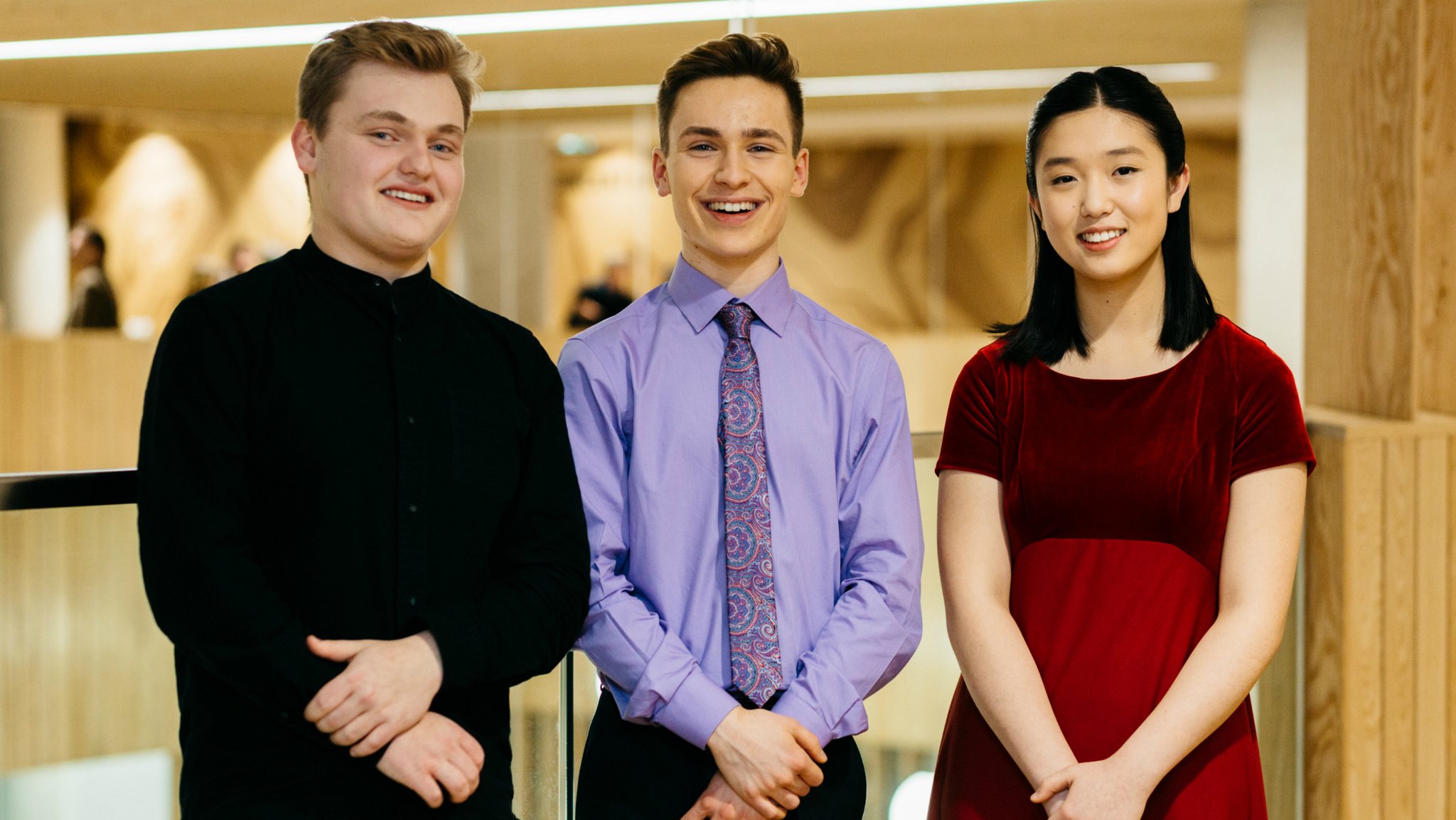BBC Young Musician 2018 Final, Symphony Hall, Birmingham review - sky-high standards | reviews, news & interviews
BBC Young Musician 2018 Final, Symphony Hall, Birmingham review - sky-high standards
BBC Young Musician 2018 Final, Symphony Hall, Birmingham review - sky-high standards
Three very different musical personalities compete for the trophy

The BBC Young Musician final was a big event in Birmingham. It drew a capacity audience to Symphony Hall, as enthusiastic, engaged and encouraging as any of the competitors could have wished. After the prodigious talent on show in the section finals, it was no surprise that the standards here were sky high.
First up was cellist Maxim Calver (pictured below left), who performed Tchaikovsky’s Rococo Variations (in the standard revised version). Calver has said that he is most comfortable in chamber music, so having to compete in a concerto final wasn’t necessarily ideal for him. But the Tchaikovsky was a good fit, not least for the many moments of intimacy and guarded, tender expression the score offers. Conductor Mark Wigglesworth kept the City of Birmingham Symphony Orchestra to modest dynamics throughout, and the communication between soloist, conductor and orchestra was ideal. There were a few hairy tuning moments in the orchestral strings here, though otherwise the CBSO had a good evening. Calver was also insecure in some of the very high music and the artificial harmonics, though I’ve heard worse from seasoned professionals. But the lasting impression from this performance was of a finely graded balance between the score’s Classical reserve and Romantic expression.
Saxophonist Robert Burton (pictured below centre) also picked the ideal piece – no mean feat given the paucity of classical sax repertoire – with the Paul Creston Alto Saxophone Concerto. The work is 1940s neo-Romantic Americana, more Hollywood than jazz, but with plenty of soaring, expressive melodies. In fact, Burton turned everything here into a melody; his bright, rich tone and intelligent phrasing made even the runs and ornaments sound like song. Despite the limited tonal variety of the instrument, Burton was also able to convey a range of colours and moods, aided in the outer movements by some inventive accompaniments from Creston. The composer’s orchestral thinking is more threadbare in the slow movement, with a distinct lack of support from the ensemble. But that didn’t matter to Burton, who was easily able to carry the rich melodic lines unaided.
To conclude, pianist Lauren Zhang, playing Prokofiev’s Second Piano Concerto, a feat of unimaginable virtuosity for a 16-year-old, or even for a pianist of any age. In the section final, Zhang had demonstrated astonishing virtuosity in Kapustin, but also an impressive maturity of expression in Rachmaninov. Although she told the cameras that the Prokofiev allowed her to show off both sides, the Second Concerto is more about flash than sentiment. That said, if you can play it the way she does, you should. All the notes were there, and more. Particularly impressive was the way in which Zhang structured the sometimes sprawling paragraphs. The extended first movement cadenza built gradually, with an impressive patience and sense of the music’s scale. The Scherzo second movement wasn’t quite the intended moto perpetuo, but was as fiery and vibrant as anybody could wish. Plenty of drama, too, in the march episodes and jagged offbeat interjections in the third and fourth movements.
As we waited for the result, Sheku Kanneh-Mason, winner of the last competition, performed the finale of Elgar’s Cello Concerto, his natural and unassuming musicianship the model for any young musicians to follow. The mood was different here, Kanneh-Mason had nothing to prove, nor had the audience to scrutinise his performance. Even so, his relaxed engagement with the audience felt like the exact quality that the jury were looking for, certainly in 2016 and no doubt this time round as well.
The result: the winner was Lauren Zhang. Given the superhuman display of keyboard virtuosity we had just heard from her, that didn’t come as a surprise. She was clearly living the Prokofiev, and there was much more to her reading than just the virtuosity required, even if there were sides to her pianism displayed in earlier rounds that we didn’t get a chance to hear in the final. In fact, all three contestants could easily have taken the trophy, and if I’m honest, I’d have given it to Robert Burton.
- The BBC Young Musician 2018 final is available to listen to here
- Read more classical music reviews on theartsdesk
rating
Explore topics
Share this article
Add comment
The future of Arts Journalism
You can stop theartsdesk.com closing!
We urgently need financing to survive. Our fundraising drive has thus far raised £49,000 but we need to reach £100,000 or we will be forced to close. Please contribute here: https://gofund.me/c3f6033d
And if you can forward this information to anyone who might assist, we’d be grateful.

Subscribe to theartsdesk.com
Thank you for continuing to read our work on theartsdesk.com. For unlimited access to every article in its entirety, including our archive of more than 15,000 pieces, we're asking for £5 per month or £40 per year. We feel it's a very good deal, and hope you do too.
To take a subscription now simply click here.
And if you're looking for that extra gift for a friend or family member, why not treat them to a theartsdesk.com gift subscription?
more Classical music
 Appl, Levickis, Wigmore Hall review - fun to the fore in cabaret and show songs
A relaxed evening of light-hearted fare, with the accordion offering unusual colours
Appl, Levickis, Wigmore Hall review - fun to the fore in cabaret and show songs
A relaxed evening of light-hearted fare, with the accordion offering unusual colours
 Lammermuir Festival 2025, Part 2 review - from the soaringly sublime to the zoologically ridiculous
Bigger than ever, and the quality remains astonishingly high
Lammermuir Festival 2025, Part 2 review - from the soaringly sublime to the zoologically ridiculous
Bigger than ever, and the quality remains astonishingly high
 BBC Proms: Ehnes, Sinfonia of London, Wilson review - aspects of love
Sensuous Ravel, and bittersweet Bernstein, on an amorous evening
BBC Proms: Ehnes, Sinfonia of London, Wilson review - aspects of love
Sensuous Ravel, and bittersweet Bernstein, on an amorous evening
 Presteigne Festival 2025 review - new music is centre stage in the Welsh Marches
Music by 30 living composers, with Eleanor Alberga topping the bill
Presteigne Festival 2025 review - new music is centre stage in the Welsh Marches
Music by 30 living composers, with Eleanor Alberga topping the bill
 Lammermuir Festival 2025 review - music with soul from the heart of East Lothian
Baroque splendour, and chamber-ensemble drama, amid history-haunted lands
Lammermuir Festival 2025 review - music with soul from the heart of East Lothian
Baroque splendour, and chamber-ensemble drama, amid history-haunted lands
 BBC Proms: Steinbacher, RPO, Petrenko / Sternath, BBCSO, Oramo review - double-bill mixed bag
Young pianist shines in Grieg but Bliss’s portentous cantata disappoints
BBC Proms: Steinbacher, RPO, Petrenko / Sternath, BBCSO, Oramo review - double-bill mixed bag
Young pianist shines in Grieg but Bliss’s portentous cantata disappoints
 theartsdesk at the Lahti Sibelius Festival - early epics by the Finnish master in context
Finnish heroes meet their Austro-German counterparts in breathtaking interpretations
theartsdesk at the Lahti Sibelius Festival - early epics by the Finnish master in context
Finnish heroes meet their Austro-German counterparts in breathtaking interpretations
 Classical CDs: Sleigh rides, pancakes and cigars
Two big boxes, plus new music for brass and a pair of clarinet concertos
Classical CDs: Sleigh rides, pancakes and cigars
Two big boxes, plus new music for brass and a pair of clarinet concertos
 Waley-Cohen, Manchester Camerata, Pether, Whitworth Art Gallery, Manchester review - premiere of no ordinary violin concerto
Images of maternal care inspired by Hepworth and played in a gallery setting
Waley-Cohen, Manchester Camerata, Pether, Whitworth Art Gallery, Manchester review - premiere of no ordinary violin concerto
Images of maternal care inspired by Hepworth and played in a gallery setting
 BBC Proms: Barruk, Norwegian Chamber Orchestra, Kuusisto review - vague incantations, precise laments
First-half mix of Sámi songs and string things falters, but Shostakovich scours the soul
BBC Proms: Barruk, Norwegian Chamber Orchestra, Kuusisto review - vague incantations, precise laments
First-half mix of Sámi songs and string things falters, but Shostakovich scours the soul
 BBC Proms: Alexander’s Feast, Irish Baroque Orchestra, Whelan review - rapturous Handel fills the space
Pure joy, with a touch of introspection, from a great ensemble and three superb soloists
BBC Proms: Alexander’s Feast, Irish Baroque Orchestra, Whelan review - rapturous Handel fills the space
Pure joy, with a touch of introspection, from a great ensemble and three superb soloists
 BBC Proms: Moore, LSO, Bancroft review - the freshness of morning wind and brass
English concert band music...and an outlier
BBC Proms: Moore, LSO, Bancroft review - the freshness of morning wind and brass
English concert band music...and an outlier

Comments
I have to agree simply with
For me the best thing I have